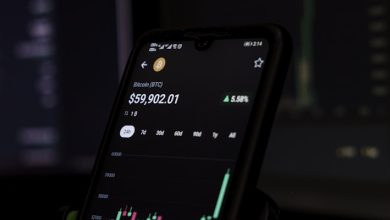What Are Altcoins? A Beginner’s Guide to Alternative Cryptocurrencies

- Understanding Altcoins and their role in the cryptocurrency market
- Exploring the variety of altcoins available to investors
- How altcoins differ from Bitcoin and why they are gaining popularity
- Key factors to consider when investing in altcoins
- The potential risks and rewards of trading alternative cryptocurrencies
- Tips for beginners looking to navigate the world of altcoins
Understanding Altcoins and their role in the cryptocurrency market
Altcoins are alternative cryptocurrencies to Bitcoin that have gained popularity in the cryptocurrency market. These coins offer different features and functionalities compared to Bitcoin, providing users with a diverse range of options to choose from in the digital currency space.
While Bitcoin remains the dominant cryptocurrency, altcoins play a crucial role in the market by offering unique use cases and technology innovations. Some altcoins focus on privacy and security, while others prioritize scalability or smart contract capabilities.
Investing in altcoins can be a way to diversify a cryptocurrency portfolio and potentially capitalize on the growth of specific projects or technologies. However, it’s essential to research each altcoin thoroughly before investing, as the market can be volatile and unpredictable.
Overall, altcoins contribute to the vibrant and dynamic nature of the cryptocurrency ecosystem, driving innovation and competition that ultimately benefits users and developers alike.
Exploring the variety of altcoins available to investors
Investors have a wide array of altcoins to choose from, each offering unique features and potential for growth. Some popular altcoins include Ethereum, Litecoin, Ripple, and Dash. Ethereum is known for its smart contract capabilities, while Litecoin is often referred to as the silver to Bitcoin’s gold. Ripple focuses on facilitating cross-border payments, and Dash offers increased privacy and speed in transactions. These altcoins, among many others, provide investors with alternatives to Bitcoin and the opportunity to diversify their cryptocurrency portfolios. It’s important for investors to research each altcoin thoroughly before making any investment decisions to ensure they align with their financial goals and risk tolerance levels.
How altcoins differ from Bitcoin and why they are gaining popularity
Altcoins, or alternative cryptocurrencies, have been gaining popularity in recent years due to their unique features and differences from Bitcoin. While Bitcoin was the first cryptocurrency created and remains the most well-known, altcoins offer a variety of options for investors and users looking for alternatives.
- One key way altcoins differ from Bitcoin is in their underlying technology. While Bitcoin uses a proof-of-work consensus mechanism, many altcoins have adopted different consensus algorithms such as proof-of-stake or delegated proof-of-stake. These alternative mechanisms can offer benefits such as increased security, scalability, and energy efficiency.
- Another factor that sets altcoins apart from Bitcoin is their focus on specific use cases or industries. While Bitcoin aims to be a general-purpose digital currency, altcoins like Ethereum, Ripple, and Litecoin have been designed with specific goals in mind, such as smart contracts, cross-border payments, or faster transaction speeds.
- Additionally, altcoins often have different supply mechanisms than Bitcoin. While Bitcoin has a capped supply of 21 million coins, many altcoins have different issuance schedules or maximum coin supplies. This can impact factors such as inflation rates and scarcity, which in turn can affect the value and volatility of the cryptocurrency.
Overall, altcoins offer a diverse range of options for cryptocurrency enthusiasts, investors, and developers. Their unique features and differences from Bitcoin have contributed to their growing popularity and adoption in the digital currency ecosystem. As the cryptocurrency market continues to evolve, altcoins are likely to play an increasingly important role alongside Bitcoin as part of a vibrant and diverse ecosystem.
Key factors to consider when investing in altcoins
When considering investing in altcoins, there are several key factors to keep in mind to make an informed decision. One important factor is the market capitalization of the altcoin. Market capitalization reflects the total value of the altcoin in circulation and can give you an idea of its overall size and stability. Another crucial factor to consider is the technology behind the altcoin. Understanding the technology can help you assess its potential for growth and sustainability in the long run. Additionally, it is essential to research the team behind the altcoin. A strong and experienced team can increase the likelihood of success for the altcoin. Another factor to consider is the community and support surrounding the altcoin. A strong and active community can contribute to the altcoin’s success and adoption. Lastly, it is important to consider the liquidity of the altcoin. Higher liquidity can make it easier to buy and sell the altcoin at any given time. By taking these factors into account, you can make more informed decisions when investing in altcoins.
The potential risks and rewards of trading alternative cryptocurrencies
Trading alternative cryptocurrencies, or altcoins, can be both exciting and risky. These digital assets have the potential to offer significant rewards, but they also come with their fair share of risks that investors should be aware of.
One of the main rewards of trading altcoins is the opportunity for high returns. Many altcoins have experienced explosive growth in value, making early investors substantial profits. Additionally, altcoins can provide diversification to a cryptocurrency portfolio, potentially reducing overall risk.
However, it’s essential to recognize the risks involved in trading altcoins. These digital assets are often more volatile than major cryptocurrencies like Bitcoin and Ethereum, meaning that their prices can fluctuate dramatically in a short period. This volatility can lead to significant losses if not managed carefully.
Another risk to consider is the lack of regulation in the altcoin market. Unlike traditional financial markets, the cryptocurrency space is relatively unregulated, making it vulnerable to fraud and manipulation. Investors should exercise caution and conduct thorough research before investing in any altcoin.
Overall, trading altcoins can be a rewarding venture for those willing to take on the associated risks. By understanding the potential rewards and pitfalls of the altcoin market, investors can make informed decisions and navigate this exciting but volatile space successfully.
Tips for beginners looking to navigate the world of altcoins
For beginners looking to navigate the world of altcoins, there are a few key tips to keep in mind. Firstly, it’s important to do thorough research before investing in any alternative cryptocurrencies. Make sure to understand the technology behind the altcoin, as well as the team and community supporting it.
Another important tip is to diversify your altcoin portfolio. Instead of putting all your eggs in one basket, consider investing in a variety of different altcoins to spread out your risk. This way, if one altcoin performs poorly, you won’t lose everything.
Additionally, stay up to date with the latest news and developments in the altcoin market. Cryptocurrency is a rapidly evolving space, and staying informed can help you make better investment decisions. Follow reputable sources, such as crypto news websites and social media channels of altcoin projects.
It’s also crucial to be mindful of security when dealing with altcoins. Store your altcoins in secure wallets and enable two-factor authentication wherever possible. Be cautious of phishing scams and only use trusted exchanges for buying and selling altcoins.
Finally, consider consulting with experienced traders or financial advisors before making any major investment decisions in the world of altcoins. Their expertise can provide valuable insights and help you navigate the complex and often volatile altcoin market more effectively.



